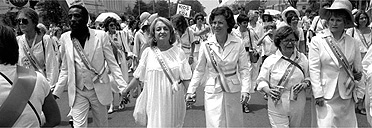
Leaders of America's women's movement were in mourning yesterday for Betty Friedan, whose broadside in her book, The Feminine Mystique, against the 1950s ideal of a suburban domestic bliss gave voice to modern feminism.
She died at her home in Washington, DC of congestive heart failure on Saturday, her 85th birthday. For a generation of women who came of age in the 1960s and after, Friedan's dissection of enforced domesticity was a revelation. At a time when well behaved children and a big house in the suburbs were meant to represent the acme of female aspiration, she validated the feelings of many women that there could be more to life - or, as she wrote, giving voice to "the problem that has no name"."Betty recognized a longing in the women of her generation, a longing for something more - opportunity, recognition, fulfillment, success, a chance to live their own dreams beyond the narrow definition of 'womanhood' that had limited their lives," Kim Gandy, president of the National Organisation of Women, said in a statement. The Feminine Mystique sold more than 3m copies, putting Friedan at the centre of the social upheaval of the 1960s and 1970s, and making her an icon of the American women's movement.
"She opened doors and minds, breaking down barriers for women and enlarging opportunities for women and men for generations to come. We are all the beneficiaries of her vision," Hillary Clinton, the Democratic Senator from New York, told the Associated Press.

